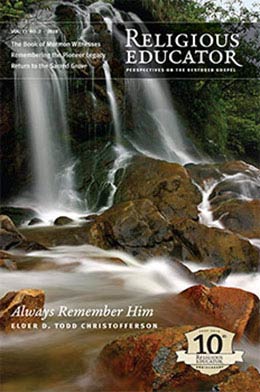"Both are Edified and Rejoice Together"
Editor's Note
I am completing my sixteenth academic year at BYU this semester. A flood of memories has crossed my mind. I have taught many different classes, including world civilization, Utah history, Church history, Doctrine and Covenants, Old and New Testaments, Book of Mormon, and American government and society (an honors course covering the time from the founding of the United States through the Civil War). Some semesters have been in Jerusalem (with field trips to Jordan, Egypt, and Turkey), Rome, and Athens.
I wish they had all been perfect classes. They have not been, and much of the responsibility is mine. I think that taking personal responsibility without trying to shift blame may be the hardest thing for us to do. It seems there is always someone else to blame; however, if we are going to make real progress, the blame game needs to end, and we need to take responsibility for our students and for our classrooms.
To improve my teaching, I invited two students from BYU’s Students Consulting on Teaching (SCOT) program to help me this semester. This program provides a variety of options to help teachers on campus. During one class period they sat in on the class, taking notes. In another class they asked me to leave and interviewed the class, also providing students an opportunity to provide written individual responses to the questions asked. In another class they simply watched the students and me. Finally, they came into class and filmed the class. For each session the SCOT’s students provided me a well-organized summary, highlighting the positive and providing student perspectives to two questions: “What hinders your learning in class?” and “What suggestions do you have for improving this class?”
Obviously, not all teachers have access to such a well-run program. However, every teacher can get some feedback from students, parents, and priesthood leaders. Nothing prevents us from inviting someone to our class to observe. Of course, inviting feedback is scary. We might hear something about our teaching that will make us feel uncomfortable. In the end we should recall the Lord’s command to teachers, “Wherefore, he that preacheth and he that receiveth, understand one another, and both are edified and rejoice together” (D&C 50:22). If the Lord invites both the teacher and the student to be edified so they “rejoice together,” then taking a personal assessment of where we are in our teaching may be a blessing even though it may cause some discomfort. We are all teachers even if not in an official classroom setting. Teaching is what we do—by word and deed.
Richard Neitzel Holzapfel
Editor
